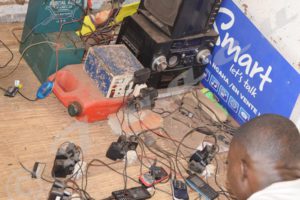The use of solar energy is gaining momentum in rural areas. It is improving living conditions of rural communities and offers some economic opportunities at low cost as testimonies collected from the rural district of Kabezi indicate.

Jean Claude Habonimana in his shop where he charges phones for money using solar energy
Solar power system is transforming places that traditionally did not access electricity through power grid. Those rural areas that used to rely on oil for home lighting have shifted to solar energy. Rural inhabitants report many overarching benefits. Home lighting has become more efficient. Oil lamps gave feeble light and had to be moved to different places of the house to be lit, but with solar panels “all the rooms of my house and my kitchen are lit, the outside of home as well.
Chances of ill-intentioned people approaching my home without being seen are very low now”, says Callixte Hakizimana, from Masama , a farmer aged 30 and father of one child. Many rural inhabitants can now run electric equipment like radios. A novelty.
Power is not only available but also near. In some places, people no longer have to go to remote areas to charge their phones or have their hair cut. They can do it at home or in the neighbourhood. “We used to travel long distances to charge our phones. Not only did we have to walk long distances to get power, but also did we have to wait for a long time because the queues were long. But now if you don’t have your own power system, your neighbour does”, says Nduwayo Innocent, 30, a farmer and father of twins who also lives in Masama.
Solar power provides various economic opportunities for rural inhabitants. First off, the solar kit for rural areas is not expensive. “The kit we need to light our homes here is not expensive at all. Even the poor can afford it. Buying oil to light my home, batteries for my radio and having to pay to charge my phone used to cost me, in the long run, more than I paid for my kit”, adds Hakizimana. “It’s business. It has been helping me to earn my living since I graduated and couldn’t find a job as a teacher. Even now that I teach, I still do this job during holidays”, says Jean Claude Habonimana, 28. He is a primary school teacher who has a shop where he charges phones for money using solar energy in Migera. Other economic opportunities include haircutting, opening shops till late without the fear of robbery or fire that can be caused by oil lamps or candles.
“If you use oil lamp in your house, after one month or so, the mosquito net is blackened. If the net has been transformed to that point, what about the person sleeping in it?”, observes Nduwayo about health benefits that he believes to come with the shift from oil light to solar light. “When I studied at night on an oil lamp or candle, I would find black residues in my noise the following morning. It is not the case now with my solar light system”, says Vincent Batungwanayo, a student from Cumba. For the likes of Vincent, other advantages of electric lighting system are allowing them more nighttime productivity and protecting themselves from eye problems due to reading in insufficient light.
Access rate to electricity is below 10% in Burundi. It was estimated at around 5% according to statistics issued by the Ministry of Energy and Mines in 2013.Mainly, towns like Bujumbura and Gitega have larger access to electricity. Rural areas scarcely have access to power grid. Many activities requiring light are solely done in daylight. Electrical equipment is almost non-existent. The fact that rural residents are taking the question of energy in their own hands and enjoying the benefits that come with having electricity at home is a real turnaround.



















 IWACU Open Data
IWACU Open Data

